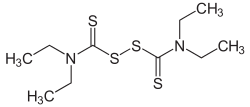Disulfiram-like drug
| Disulfiram-like drug | |
|---|---|
| Drug class | |
 Disulfiram, the prototypical drug of this class. | |
| Class identifiers | |
| Synonyms | Alcohol sensitizers; Alcohol-sensitizing agents; Alcohol-deterrent drugs; Acetaldehyde dehydrogenase inhibitors |
| Use | Alcoholism |
| Biological target | Acetaldehyde dehydrogenase, others |
| Legal status | |
| In Wikidata | |
A disulfiram-like drug is a drug that causes an adverse reaction to
The
Unlike acetaldehyde dehydrogenase inhibitors and other disulfiram-like drugs, alcohol dehydrogenase inhibitors such as fomepizole (brand name Antizol) inhibit the metabolism of alcohol into acetaldehyde, thereby increasing and extending the effects of alcohol and reducing its toxicity.[4] As such, they can be thought of as converses of disulfiram-like drugs.[4] Fomepizole is used medically as an antidote against methanol and ethylene glycol poisoning.[4]
List of agents
Intended
Drugs which cause disulfiram-like reactions upon ingestion of alcohol as an intended effect include:[5]
- Calcium carbimide
- Disulfiram
- Hydrogen cyanamide
Unintended
Drugs which cause disulfiram-like reactions upon ingestion of alcohol as an unintended effect include:[6][1][7]
- Abacavir
- Cephalosporins, but only these with a methylthiotetrazole side chain or a methylthiodioxotriazine ring; thought to be due to common N-methylthiotetrazole metabolite, which is similar in structure to disulfiram.[8] Such drugs include cefamandole, cefmenoxime, cefmetazole, cefonicid, cefoperazone, cefotetan, ceftriaxone, and latamoxef (moxalactam).[9][10]
- Chloral hydrate
- Chloramphenicol
- Ethacrynic acid
- Griseofulvin (weak evidence)[8]
- Hydrazines
- Isoniazid: causes headache via a non-ALDH2 mechanism[8]
- Procarbazine
- Ketoconazole (weak evidence)[8]
- immunosuppressants such as pimecrolimus and tacrolimus
- Mepacrine (quinacrine)
- Nilutamide
- Nitrovasodilators (nitrates) such as nitroglycerin
- Nitroimidazoles such as benznidazole, metronidazole (disproven),[8] ornidazole.
- Pargyline
- Phenacetin
- Phentolamine
- Phenylbutazone
- Propranolol
- Sulfiram
- Sulfonamides: sulfamethoxazole likely safe[8]
- Sulfonylureas, specifically the first generation:[8] chlorpropamide, glibenclamide (glyburide), and tolbutamide
- Tolazoline
A number of drugs do not cause disulfiram-like reactions, but have other unintended interactions with alcoholic drinks. For example, alcohol interferes with the efficacy of erythromycin. Patients on linezolid and tedizolid may be sensitive to the tyramine present in tap beers and red wine.[8]
Natural
Natural compounds and species which have been found to cause disulfiram-like reactions upon ingestion of alcohol include:[11][12]
- Coprinus atramentarius (common inkcap), and Imperator torosus(brawny bolete) among others
- Kudzu (Pueraria lobata), conflicting evidence[13]
List of agents previously thought to cause disulfiram-like reactions
See also
References
- ^ ISBN 978-1-4557-4987-4.
- ^ S2CID 45547473.
- ^ Mutalik, M., & Sanghavi, D. (2014). Review of Drug Interactions: A Comprehensive Update.
- ^ PMID 26551875.
- ISBN 978-3-642-70048-4.
- ISBN 978-0-12-809334-4.
- ISBN 978-1-4613-3626-6.
- ^ PMC 7038249.
- PMID 3593530.
- ISBN 978-0-07-147914-1.
- ISBN 978-0-8166-1407-3.
- ISBN 978-0-8493-0194-0.
- ^ "Herbal Approaches to Alcohol Dependence: Evidence and Risks". Pharmacy Times. 7 December 2016.
- PMID 34292926.
- PMID 25223673. Retrieved 22 February 2022.
External links
 Media related to Disulfiram-like drugs at Wikimedia Commons
Media related to Disulfiram-like drugs at Wikimedia Commons
